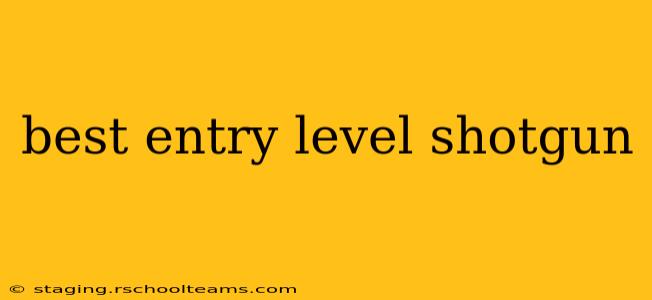Choosing your first shotgun can feel overwhelming. The market offers a dizzying array of options, each with its own features, price point, and intended use. This guide cuts through the noise, providing a detailed look at the best entry-level shotguns for various needs, ensuring you make an informed decision.
What Makes a Shotgun "Entry-Level"?
Before diving into specific models, let's define what constitutes an entry-level shotgun. Generally, these shotguns fall into the price range of $300-$800, offering a balance of quality, reliability, and affordability. They are typically designed for beginners and are suitable for various activities like clay shooting, hunting small game, and home defense (with proper training and legal compliance, of course). They often feature simpler mechanisms than higher-end models, making them easier to maintain and learn to use.
Key Factors to Consider When Choosing Your First Shotgun
Several factors should guide your selection. Consider these crucial aspects before making a purchase:
1. Gauge:
- 12 Gauge: The most popular choice, offering a wide selection of ammunition and a powerful punch. However, it's also the heaviest and has the most recoil. Ideal for hunting larger game or home defense.
- 20 Gauge: Lighter and with less recoil than 12 gauge, making it a great option for smaller-framed shooters or those new to shotguns. Still suitable for hunting smaller game and clay shooting.
- .410 Bore: The smallest gauge commonly available, with the lightest recoil. Best suited for beginners or for very small game hunting. Ammunition options are more limited.
2. Action Type:
- Pump-Action: Simple, reliable, and relatively inexpensive. Requires manual operation to reload. A good choice for beginners due to their simplicity and ease of maintenance.
- Semi-Automatic: Loads automatically after each shot, offering faster follow-up shots. More complex mechanically and can be more expensive to maintain. Generally, not recommended as a first shotgun.
- Break-Action (Over-and-Under or Side-by-Side): Elegant and reliable but typically more expensive than pump-actions. These are usually reserved for more experienced shooters and specific types of shooting (e.g., clays).
3. Barrel Length:
Barrel length affects several aspects of the shotgun: a longer barrel generally means better accuracy and less recoil. Shorter barrels are more maneuverable, beneficial for home defense or hunting in dense cover. Consider your intended use when choosing barrel length.
4. Stock and Fit:
Proper stock fit is crucial for comfort and accuracy. A shotgun that doesn't fit you properly will be uncomfortable to shoot and might lead to poor accuracy. Consider visiting a gun store to try different shotguns and determine what fits you best.
Top Entry-Level Shotgun Recommendations (By Action Type):
Note: Prices are approximate and can vary based on retailer and specific model. Always check current pricing before purchasing.
Pump-Action Shotguns:
- Mossberg 500/Maverick 88: A highly regarded and incredibly reliable option. Known for its durability and ease of maintenance. Available in various gauges and configurations. Price range: $300-$500.
- Remington 870 Express: Another classic and highly reliable pump-action shotgun. Slightly more expensive than the Mossberg but equally durable. Price range: $400-$600.
Semi-Automatic Shotguns (For more experienced beginners):
- Stoeger M3000: A relatively affordable semi-automatic shotgun that offers good reliability and performance. Suitable for those wanting the advantage of automatic loading. Price range: $500-$700. (Consider this only if you're comfortable with more complex firearm mechanisms)
Beyond the Shotgun: Safety and Training
Remember, a shotgun is a powerful tool. Before purchasing any firearm, prioritize safety training. Take a certified firearms safety course to learn proper handling, storage, and safe shooting practices. This is crucial for responsible gun ownership.
Conclusion:
Choosing the best entry-level shotgun depends heavily on your individual needs, budget, and intended use. Carefully consider the factors discussed above and research the specific models mentioned. Remember to handle and shoot different shotguns, if possible, before making your final decision. Above all, prioritize safety and responsible gun ownership.
